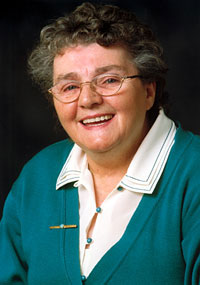14 August 2008 Edition
The Mary Nelis Column

The women in grey blankets
IT WAS to break down the wall of silence around the H-Blocks and Armagh Jail that ordinary women, from a generation literally tied to the kitchen sinks, suddenly found themselves in the forefront of a campaign to defend the rights of their children and their community labelled by the British Government as criminal and subversive.
The Relatives Action Committees – set up in 1976 by the mothers, wives and sisters of prisoners – would become the vanguard of an intense and painful struggle in support of political status that would subsequently see the British Government indicted by people in countries right across the globe.
The women who banded together in the RACs belonged to a generation that lived through the 1960s when the nationalist people were struggling to get off their knees. They encouraged and supported the Civil Rights campaign in the hope that the generation of children now growing up in the North would not be treated as second-class citizens, not like their generation.
The events of August 1969, the Battle of the Bogside and the attacks on the Catholic community by unionist militias forewarned of desperate times ahead but they held the line and tried to persuade their children and partners that non-violence was the way ahead, even when British soldiers were turning their communities into prison camps.
When internment and Bloody Sunday threatened the non-violence of the Civil Rights movement they hoped that the use of physical force would not become the only form of resistance to the military might of the British Army on the streets, and prayed that the war declared by the British against the IRA would not come to their doors.
It did and they watched as their sons and daughters were dragged from their beds in early-morning raids. Most would end up in the H-Blocks and Armagh Women’s Prison. They would find out in the months ahead that their children were being kept naked in solitary confinement, in cells without even a bed, and at the mercy of sectarian prison officers who thought nothing of stubbing out cigarette butts on the naked backs of the prisoners.
It was the megaphone diplomacy of the Relatives Action Committees, in bare feet and clad only in blankets to symbolise the conditions of the prisoners, that began to penetrate the silence around the H-Blocks. They travelled the length and breadth of Ireland, standing outside churches and in town centres.
In 1977, a group of mothers took the campaign to Europe. As they stood outside the British Airways offices in the Champs Elysées, with a mural depicting the conveyor-belt system of arrest, ill-treatment, Diplock Courts and imprisonment in the H-Blocks, traffic came to a standstill. They stood in bare feet and blankets outside British embassies in The Hague, Brussels and Geneva.
Another group travelled to the United States and, despite the concerted efforts of both the British and Irish government officials, the story of the treatment of the H-Block prisoners, as told simply by relatives, appeared on the front page of The Washington Post.
The women of the Relatives Action Committees became skilled orators, speaking on platforms in the now recognisable grey blankets in major cities around the world. They visited the European Parliament, the Dutch parliament in The Hague and gave the sermon at a Mass in the underground chapel of the French Metro system.
Next Sunday, with the ex-prisoners, they will lead the National Hunger Strike Commemoration in Derry. As we pay tribute to the men who died, we also pay tribute to those from the RACs who also gave their lives for rights, equality and freedom.


